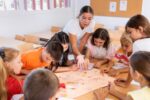Key points:
- Social growth is a critical part of a student's K-12 learning experience
- Students don't have to sacrifice social opportunities just because they learn online
- See related article: Leveraging edtech to help students, teachers stay connected
- Stay up to date on the latest trends about learning in the digital age
The expansion of online education has been a real boon for busy parents, teachers, and students. Online learning lets children learn from the comfort of their own homes and gives teachers a chance to set their own schedules.
More News from eSchool News
How 4 districts use AI tools to transform education
Simply put, AI can do a lot–it can personalize learning, help students expand on ideas for assignments, and reduce time spent on administrative tasks, freeing up educators to spend more time on instruction.
What I learned building an AI tool for my own kids (and millions more worldwide)
A recent survey found that 88 percent of U.S. parents believe AI is essential to their children’s education, but most aren’t even sure whether the technology is being used in their child’s classroom.
Can AI help reduce math anxiety?
As AI becomes more widespread in education, more than half of high school students (56 percent) polled think it can go a long way in reducing math anxiety, a new global survey shows.
Here’s what birdwatching taught me about classroom management
Teachers often seem to have eyes in the back of their heads. They respond to a murmured question in a class full of conversation. They can tell if someone’s skipping class a floor away by reading faces in the room.
Beyond digital literacy: Why K-12 educators must prioritize data literacy
While digital literacy has become an aspirational cornerstone of modern education, the exponential growth of data-driven decision-making across industries reveals critical gaps that demand a stronger focus on data literacy.
How to teach K-12 coding without computers
Teaching K-12 coding without computers may seem like a daunting task, but it can be a powerful way to introduce students to the fundamental concepts of computer science and problem-solving without the distraction of technology.
SkillsUSA competitions give students hands-on experience with career skills
The most effective way for students to learn career-ready skills in fields such as advanced manufacturing and robotics is by applying these skills in the context of authentic projects and real-world scenarios.
The human edge in the AI era
In the Future of Jobs 2025 report, the World Economic Forum predicts that 60 percent of jobs will require upskilling or retraining, or they’ll be threatened. The skills we have today may not keep us secure for long.
Growing challenges for school counselors impact student outcomes
Middle and high school counselors juggle overwhelming caseloads, expanded mental health duties, and additional administrative burdens–all of which limit their ability to provide individualized support for students.
Philly teacher embraces AI but treads carefully amid data privacy and bias concerns
When Adrienne Staten’s fellow teachers first started talking about using artificial intelligence tools in their classrooms, Staten was not on board.











